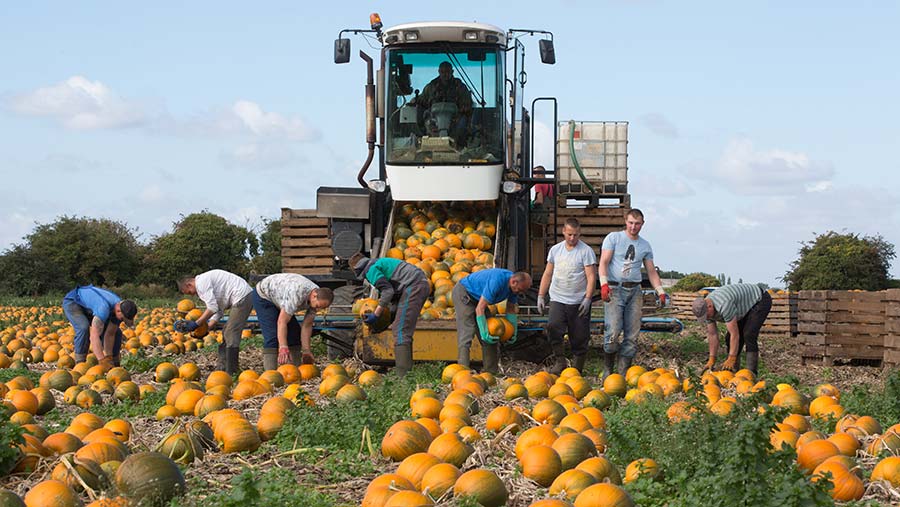Truss plans to expand seasonal farm labour scheme welcomed
 © Tim Scrivener
© Tim Scrivener Industry leaders have welcomed reports that prime minister Liz Truss plans to let more foreign workers enter the UK to work on farms picking and packing edible and ornamental crops.
Ms Truss is said to be drawing up plans to reform the immigration system which would allow farm businesses to recruit more staff from overseas. However, the collapse of the pound will make it less attractive for foreign workers to seek jobs in the UK.
The UK government expanded the Seasonal Worker Scheme (SWS) this year to allow 30,000 temporary migrants to come to the UK for up to six months, with a reserve of a further 10,000 visas if necessary.
See also: Fruit and veg worth £22m left to rot due to labour shortages
The NFU warned that demand for seasonal workers this year was as high as 55,000 due to falling numbers of EU nationals and challenges recruiting domestic workers.
Farm businesses in the horticulture sector this year have reported acute worker shortages, with some forced to close and others warn they will not be able to continue unless they can recruit more staff.
Ms Truss is believed to favour extending the SWS for 2023 to alleviate the acute labour shortages. During her campaign to become Conservative party leader and PM, she said “we need to expand this scheme”.
However, she faces resistance from Brexit supporters in her cabinet who believe more controlled immigration is what the public wants.
Matching industry needs
The NFU said the immigration system must meet the needs of British food and farming businesses and allow the sector to recruit the much-valued people it needs.
NFU deputy president Tom Bradshaw said: “Despite efforts to recruit domestically, critical and skilled jobs such as crop harvesting, packing, butchery and food processing are all facing significant shortages, and workers in these roles are essential in ensuring high-quality British food reaches the public.
“We’re pleased the government has recognised this and provided bespoke seasonal schemes for both horticulture and poultry but, given the levels of shortages these sectors have faced, we would like to see these schemes expanded to offer certainty for businesses for the years ahead and ensure they can recruit the people they need.”
Jack Ward, chief executive of the British Growers Association, welcomed any move from government to relieve staffing pressure on farm businesses.
“One of the last things former Defra secretary George Eustice did before he left office was announce a review into labour supply for the food industry, which we welcomed,” Mr Ward told Farmers Weekly.
“This latest move from prime minister Truss is recognition that we just have not got enough head count in the UK to do all the jobs that need doing.”
‘Not an immigration issue’
Mr Ward said seasonal labour in agriculture was “not an immigration issue”.
“The workers come here, do the work and go home again, so they are not adding to the immigration head count,” he said.
Mr Ward said the UK horticulture industry had struggled to recruit enough workers since Brexit, and this has forced some businesses to fold or cut production.
Several businesses had been forced to leave fruit and veg crops to rot in the ground, he said, as there were not enough workers to harvest them.
“We probably need about 70,000 seasonal farmworkers every year. The current scheme offers a maximum of 40,000. That still leaves a big shortfall,” he noted. “Whether we like it or not, we still need seasonal labour to harvest these crops.”\
A spokesman for the Home Office told Farmers Weekly the government is committed to ensuring the immigration system works for business and encourages highly skilled people and high growth businesses to choose to locate and invest in the UK.
The government will set out a plan in the coming weeks “to ensure the immigration system supports growth whilst maintaining control”.
